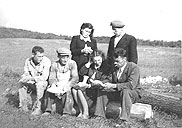Memoirs of Kruglova Olga Vladimirovna (page 3)
 From Tarnoga to Paris
From Tarnoga to Paris
When we reached the Peasant House he reminded that they would leave at three.
— We’ll be waiting for you! Good bye. We’ll be glad to help you.
The next morning I worked quite successfully in Tarnoga and at three in the afternoon the small traveling group greeted and friendly accepted me in the bus. Since that day we did everything together.
I quickly got used to the new time-table. Usually I got out before the place, where the first concert was given. So, I started to work at 5 or 6 o’clock in the evening. It was not so hot, and people returned home from the fields by that time. While the actors’ group traveled from place to place I worked without haste in some village till midnight. I worked for six or seven hours, when it was cool, when my head was fresh and when all people were at home. Then I carried whatever I collected to the road and waited for my companions. Experienced in walking tours, I helped my new friends to find a nice place in Tarnoga, where we could have a good rest and store up energy for the next night trip.
I persuaded them to have a square breakfast in the canteen at 6 o’clock in the morning and to go right through the pine forest, where the Palace of Culture was, to the ancient city rampart which was above the Tarnoga River. It was not a long way at all. It was a fascinating place in the outskirts of Tarnoga. The whole rampart was covered with pines. A soft carpet of dry moss and pine needles on sandy earth waited for us every day. A light breeze kept off mosquitoes – a great comfort in the North. The river at the foot of the rampart was transparent, like a tear, and hot to the hot sand on the bottom. And there were such smells around! The pines cried with pitch in the sun. The strong pine smell turned our heads. The herbs, high and strong, were in blossom. And the Tarnoga River brought the smell and taste of the forest to its mouth. We did not mind its shallow water at all. After the hard night we all liked to lie still and silent in its slow current. The river was soft and odorous.
Then we slept from seven to twelve under the pine trees and, when it got very hot, we went into the river again. By day we bathed, making much noise and joking to drive our dream off. At one o’clock we had lunch. From two to three – preparations: post-office, telegraph, checking costumes, and I collected the day before. At three o’clock we left again. So, we slept for five hours under the pines, had two meals a day and used the clean river instead of a hand washer in the Peasant House.
All the rest was work and road – twelve, or rather fifteen hours every day. I was delighted with such arrangement. I began to like my Sahara. And I did quite a lot in the Tarnoga district.
The most important thing was that I filled a white spot in our rich collection of Russian distaffs. I found the famous Tarnoga distaff, the most characteristic of the Vologda land. It is of a root type, made of a single piece of a tree. The huge blade is on a small lower part. It is a real giant, cut, as they say, of the whole forest. Such distaffs can be made only where there is no end of wood.
|


